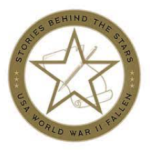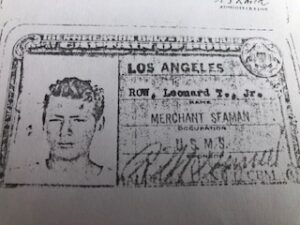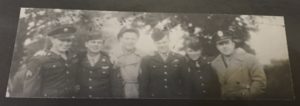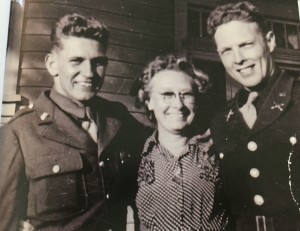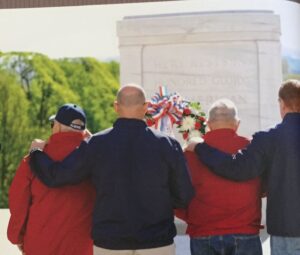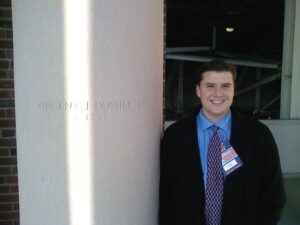Memorial Day 2022
Use controls above or click here to open this Hometown Heroes podcast in a new window
Episode #735 of Hometown Heroes, airing May 27-30, 2022, marks Memorial Day weekend by spotlighting Gold Star heroes through the stories of veterans who knew them, and went on to honor their memories in unique and meaningful ways.
This Memorial Day, visitors to Arlington National Cemetery will be able to read profiles of some of World War II’s Gold Star heroes, thanks to the ongoing efforts of the Stories Behind the Stars project, which seeks to tell the stories of all 421,000 WWII fallen by the 80th anniversary of the end of the war in 2025. Click here to join the growing list of volunteers contributing to that effort, and listen to this episode of Hometown Heroes for some examples of Gold Star heroes you could chronicle.
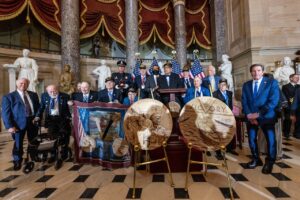
WWII Merchant Mariners receiving the Congressional Gold Medal (Photo By: Ike Hayman, House Creative Services Photographer)
Memorial Day observances will take place all over America, but in Washington, D.C., the National World War II Memorial will host a ceremony featuring remarks from WWII Merchant Marine veteran Dave Yoho. 1 out of every 26 Merchant Mariners died during World War II, making it statistically more dangerous duty that any other branch of service. Yoho was on hand when WWII Merchant Marine veterans were awarded the Congressional Gold Medal on May 18th, 2022. This episode features the memories of three different World War II veterans, all of whom had powerful connections to Gold Star heroes. We start with Leonard Blake, whose very surname originated with a fellow Merchant Marine shipmate who was killed in action May 28th, 1945.
Orphaned as an infant, he was adopted by a Los Angeles policeman who later abandoned the family, leaving Leonard with his adoptive mother, who was blind. He worked any job he could find, including some time at Bay Area shipyards, before finding his way into the U.S. Maritime Service at age 15. You’ll hear his explanation of how that all unfolded on Hometown Heroes, and how he was seriously wounded in a kamikaze attack aboard the SS Mary Ann Livermore. Eleven men aboard the Liberty ship were killed in that attack, including Leonard’s closest friend, Bob Blake.
“The bomb, when it got to me, I was on my feet and was headed for the door,” Leonard explained. “The bomb exploded about ten feet away from me, I guess.”
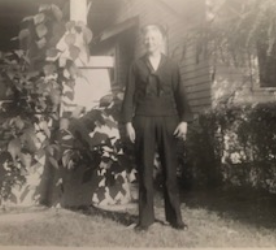
Merchant Mariner Bob Blake was killed in action May 28th, 1945. His parents later adopted his shipmate, Leonard (Row) Blake.
The reason he had to guess, or rely on what he was told, was that Leonard was knocked unconscious when the explosion sent him flying head first into the bulkhead. The young man next to him was killed, along with Bob Blake and ten others. Convinced that he, too, was in the process of dying, Leonard began making promises to God. He pledged to never smoke or drink, even though he never had, and later uttered another pledge, this time directed towards those fallen shipmates.
“I promised that I’d give them ten years of my life,” you’ll hear Leonard remember. “Each one of ’em.”
Leonard Blake passed away October 31, 2021, at the age of 93, having done everything he could to live up to that promise to his fallen brothers. One of those 11, Bob Blake, came to hold special significance because Leonard, after being discharged from the hospital, was adopted by Bob’s parents and given the Blake name. You can access the complete original interview with Leonard Blake on episode #678 of Hometown Heroes from April, 2021.
This episode also features memories from Al Findley, a former prisoner of war who lost four members of his B-24 crew when they were shot down on his Al’s 26th mission. One man who lingered significantly in his memories was Bill Fowler, the crew’s engineer, who went to the rear of the plane to investigate why the bomber’s controls weren’t working. When Fowler returned, he reported that the control cables had been severed, and all three gunners had been wounded. As Fowler turned to head back to rear and help the wounded, Findley started to go with him. The pilot’s order to stay and start jettisoning materials through the bomb bay ultimately spared Al’s life. He was in the process of following those orders when another command came from the co-pilot, instructing him to bail out.
“We were so low that I saw two sheets come out after I went,” Findley recalled of their last minute evacuation. “When I hit the ground, I hit it so hard it knocked me out and I was unconscious for I don’t know how long.”
When he came to, Findley was surrounded by German farmers. He would spend the next three months in captivity, and eventually learned that Bill Fowler and three other members of the crew, Raleigh Murray, John Gates, and Theodore Mabee, had been unable to escape the burning plane and were killed in action. Decades later, Findley purchased memorial plaques with those men’s name, and had them placed on each border of his own plaque at the Central Coast Veterans Memorial Museum in San Luis Obispo, where Al served as a docent until his passing in 2019. Access the complete original interview with Al Findley on episode #488 of Hometown Heroes from 2017, and watch the video below to see Al’s tribute to his fallen friends:
The final veteran whose voice you will hear on this Memorial Day episode is Doug Justus, who survived his combat time in World War II despite some close calls, as did his older brother, Bert. When the Korean War broke out, Bert was sent overseas again, leaving behind a wife and three young children.
Doug later learned his brother had been taken prisoner in Korea and died in captivity. Researchers have helped fill in quite a few details about Bert’s final days, and even believe they know exactly where to recover his remains, if the North Korean government would allow it. Reluctant to accept a free Honor Flight to Washington, D.C., Doug was convinced by his daughter to go, accompanied by his son.
“It was one of the best things I ever did,” you’ll hear him remember. “Looking at all those old wrinkled faces, and I thought to myself no wonder we won the war – those guys wouldn’t give an inch.”
The highlight of that journey with Central Valley Honor Flight in 2016 was the privilege of laying a wreath at Arlington National Cemetery’s Tomb of the Unknown Soldier. As he approached the monument amid the consistent sound of guards’ heels clicking, Doug’s attention turned to the brother that never came home, the father three children barely got to know.
“Bert,” Doug Justus said aloud. “You’re gone, but you’re not forgotten.”
Memorial Day is our opportunity to make sure that not a single one of the men and women who have ever given their lives in the service of our country is ever forgotten.
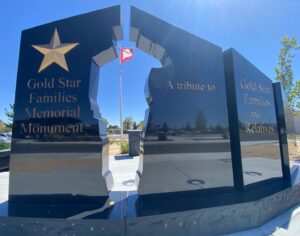
This Gold Star Families Memorial in Reno, NV is one of 99 completed so far by the Woody Williams Foundation.
You can access the complete original interview with Doug Justus on episode #421 from 2016, and one way to honor Gold Star heroes like the ones this episode taught us about is by supporting the Woody Williams Foundation. Founded by the last living World War II Medal of Honor recipient, the foundation builds Gold Star Families Memorial Monuments throughout the country. Gold Star heroes can be found in every conflict America has entered, from every branch of service, every ethnicity, and ever corner of America. The families of the fallen deserve our support, our prayers, and our gratitude 365 days per year. A final thought you’ll hear on this special Memorial Day episode explains how you can really trace back the origins of this radio program to one of World War I’s Gold Star heroes. Listen to Hometown Heroes to learn about pioneering pilot Vincent J. Dushek, and why his supreme sacrifice set off a multi-generational chain of inspiration.
—Paul Loeffler

